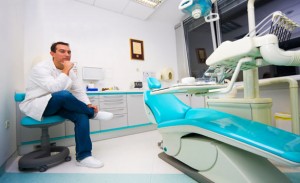Although pain is an important motivating factor for patients to visit the dentist, fear of pain is a major reason for delaying dental treatment. This is because dental treatment is often perceived as a painful experience by patients. However, with emphasis on prevention, minimal intervention and modern atraumatic treatment technique, this not necessarily true. Still, the dentist should develop the right attitude, approach and effective communication skills to deal with different types of patients. A caring and sympathetic attitude and gentle handling of patients will itself to a major extent relax them and reduce their anxiety. There are also several methods available to control pain and trauma during restorative treatment.
Category Archives: Dentist
How to Deal With a Patient Who Doesn’t Speak English
According to the 1990 US Census Bureau, 31.8 million residents, or 14% of the population 5 years old and older, reported speaking a language other than English at home. The most common non-English language spoken at home was Spanish (17.3 million) followed by French (1.9 million), German (1.5 million), Chinese (1.3 million), and Italian (1.3 million). Seven states—New Mexico, California, Texas, Hawaii, New York, Arizona, and New Jersey— reported that 20% or more of their residents did not speak English at home. Continue reading
How to Avoid a Dental Scam
 A surprising number of dental patients have questioned the billing procedures and diagnoses of their dentists. These comments are especially hard to sort out for a few reasons. For one, nobody likes going to the dentist, so it’s easy to come away with negative feelings. As well, many college students may be handling their dental insurance for the first time and may be unaware of how it works. Nonetheless, if any sort of fraud is occuring, it benefits everyone (everyone with teeth, and everyone who pays insurance premiums) to root it out. Continue reading
A surprising number of dental patients have questioned the billing procedures and diagnoses of their dentists. These comments are especially hard to sort out for a few reasons. For one, nobody likes going to the dentist, so it’s easy to come away with negative feelings. As well, many college students may be handling their dental insurance for the first time and may be unaware of how it works. Nonetheless, if any sort of fraud is occuring, it benefits everyone (everyone with teeth, and everyone who pays insurance premiums) to root it out. Continue reading
Difference Between DDS and DMD
Have you ever noticed how some dentists have the abbreviation DMD after their name and some have DDS as their suffix? You’re not alone. I too had this question, and wanted to find out why there are two different degrees for dentists. Here’s the answer:
Way back in 1840 the world’s first dental school was established in Maryland. It was called the Baltimore College of Dental Surgery (which has since merged with the University of Maryland School of Dentistry.) The Baltimore College of Dental Surgery admitted students eager to become dental professionals. Upon graduation, they were awarded the DDS degree, which stands for Doctor of Dental Surgery. Continue reading
How to Minimize Cancellations in the Dental Office
Dental appointment cancellations are a major concern of most dental offices today. Cancelled appointments lead to wasted time and money. According to Dental-tribune.com even when the economy is doing well revenue losses can range from $40,000 to $60,000 per year. This value doesn’t include the potential money that could be earned if the patient did come to the appointment, and further treatments and procedures were needed. Often practice teams place the blame of failed appointments on the patients—their lack of respect for the dentist’s time, their lack of urgency of getting the dentistry done, and just plain rudeness. Although some of the responsibility rests with patients, a significant contributor to the problem is the dental team and the lack of training on communications skills that prevent failed appointments and how to effectively handle and “turn around†cancellation calls.  Minimizing cancellations can be done in numerous ways. Continue reading
